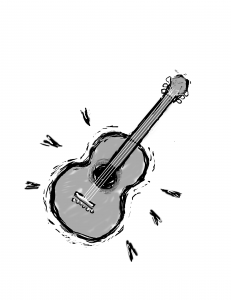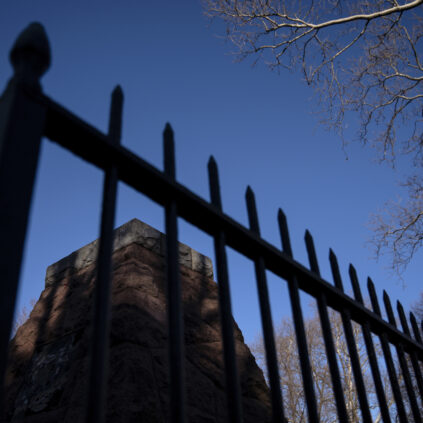
Hidden behind high stone walls and a wrought-iron gate, Edgerton Park looks like a stately sentry, a signal to cars and passersby that they have reached the New Haven-Hamden town line. But on the first Saturday of every September, Edgerton becomes an inviting festival ground. The musicians, vendors, and exhibitors at the annual Connecticut Folk Festival & Green Expo set up camp atop the park’s grassy hillsides, filling it with the mingled sounds of folk music and children at play.
Winding my way along the outskirts of this year’s festival, I take stock of the spectacle. To my right, a flock of unsupervised children gathers around a white tent where a grown-up fairy princess waves her arms in swooping circles. A young boy attempts to swivel his hips at the adjacent hula hoop station. The banner at the Wonderful Worms booth invites the brave and the dirt-loving to plunge their hands into pots of worm-filled soil and learn about its fertilizing properties. I have found my way to the kiddie section of the festival: the Green Kids’ Village.
Beyond face-painting and free childcare, the Green Kids’ Village exemplifies the festival’s commitment to education, founder and coordinator Coleen Campbell tells me. Of the more than eighty-five booths populating the vendor village this year, approximately twenty are in a workshop or performance format. The commercial aims of the festival are modest. Even vendors recognize that the most valuable aspect of a small-scale event such as CT Folk will be the customer interactions. Vendors are not just peddling their organically grown apples, for instance; along with that apple, they hand over a lesson on the harmful effects of pesticides.
These lessons are passed on to attendees of all ages, says Campbell: “When you grab kids at a young age and educate them in fun ways about the environment, hopefully they will carry on and be the next coordinator of a green expo!”
Joe DeRisi, owner of Urbanminers, a deconstruction and salvaging business in South Hamden, calls this model of education “seed planting.” The metaphor is fitting: CT Folk is ultimately an exercise in community growth. The focus on youth education and community outreach helps create a space where likeminded community members can meet and forge connections, laying the groundwork for a more cohesive and environmentally sustainable community.
The sweet melodies of folk duo Hannah & Maggie float over a sea of white tents and draw me towards the festival’s central stage. Live music is a central part of the festival. Campbell explains that folk music and environmentalism are a natural combination, harkening back to the Great Depression days of Woody Guthrie and Pete Seeger.
In previous years, the folk festival had been a ticketed event, featuring headliners like Judy Collins and Emmylou Harris.
This was its second year with free admission, and a lineup of lesser-known local musicians. Barbara Shiller, president of the CT Folk Board of Directors, says, “My hope is that people will come to the event, perhaps not having heard of the musicians, but with an understanding that they will hear good music.”
In keeping with folk’s customarily fluid definition, this year’s festival included musical acts ranging from country-inspired acoustic performers like Darrel Scott, to soulful harmonizers like Brother Sun, to quick-step bluegrass numbers performed by Yale’s own Professors of Bluegrass, which includes Yale President Peter Salovey on the bass. On and off of the low-lying, white, wooden stage, the musicians appear at ease with the crowds. Many are CT Folk regulars, and they form part of an intimate local music scene. Some, like Hannah & Maggie, are out-of-towners who have grown attached to the festival’s musical community.
CT Folk is a labor of love for all involved—Campbell, Shiller, their colleagues on the board, and the host of yellow-clad volunteers who graciously accommodate the needs of vendors, musicians, and attendees alike. Shiller invited all of the volunteers and coordinators to her home as a celebratory thank-you, both prior to and after the festival. She recognizes that local events like CT Folk are community-building acts. “Whether it’s environmental activism, or sharing in the love of music—when you’re working together to make something happen, you’re part of a community.”
This hard work has brought us CT Folk in all its summer-day glory. Vendors and customers chat like old friends. Festival volunteers call out to familiar faces in the audience. In line for Ashley’s ice cream, two strangers strike up a conversation about a side business in bike repair. Musicians, filtering off stage at the end of their act, find a spot among the scattering of picnic blankets and beach chairs, blending with audience members and playfully heckling their musical peers.
Stretching out into the late afternoon and evening, the festival stakes its claim on this last warm day in September, reminding us that there’s still time for another song.


